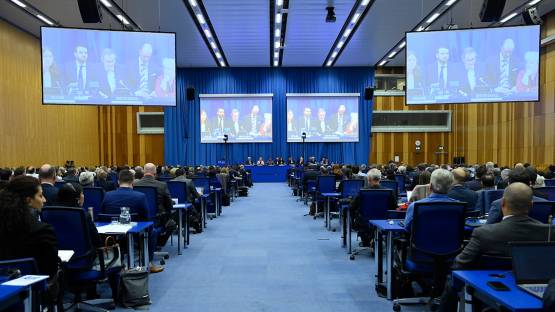Strengthening national regulatory capabilities, taking into account safety aspects of new and innovative technologies; fostering international collaboration and peer review missions; and strengthening emergency preparedness and response arrangements were all identified as shared priorities at the Joint Eighth and Ninth Review Meeting of the Convention on Nuclear Safety (CNS), which concluded in Vienna last week. The meeting was attended by 900 delegates representing 82 Contracting Parties.
IAEA Director General Rafael Mariano Grossi focused on the relevance of the Convention not only to countries with an existing nuclear power programme, but to any country considering nuclear power. In his opening remarks, he said: “The CNS is one of the most important and respected legally binding instruments in the field of nuclear safety. It is very important that the international community and countries, whether they have nuclear power or not, or whether they are considering it or not, recognize that the CNS is an instrument for all, and we all have a need and obligation to participate. As more governments embrace nuclear power to address both energy security and the climate change crisis, it is vital that they are committed to being bound by the CNS provisions.”
During the Review Meeting, other areas of nuclear safety were discussed and agreed upon by participants. These included the importance of developing strategies on ageing management and long-term operation of nuclear installations; strategies and approaches to addressing climate change and its impact on the safe operation of nuclear installations; and securing reliable nuclear supply chains.
The Contracting Parties gathered at the IAEA’s headquarters in Vienna from 20 to 31 March 2023 to exchange their experiences and lessons learned in achieving and maintaining a high level of nuclear safety worldwide. Usually held every three years, the previous Review Meeting, scheduled for 2020, was postponed due to the COVID-19 pandemic, making this the Joint Eighth and Ninth Review Meeting of the CNS.
During the first week of the meeting, Contracting Parties presented and discussed their national reports in seven Country Groups. The second week was focused on the summaries from the Country Groups and on the discussion and adoption of the Summary and President’s Reports.
Participants were also involved in the Open-Ended Working Group to discuss procedural and other issues relevant to the functioning of the Convention, and shared their experiences and lessons learned in two topical sessions – on safety culture and on ageing management of nuclear facilities.
Mr Grossi observed that international commitment to a high level of safety, as exemplified by the CNS, is exceptionally relevant in current times. He said: “Managing the unprecedented circumstances impacting the safe operation of nuclear installations has become particularly relevant recently not only with the war in Ukraine of course, but also with the COVID-19 pandemic.”
This concern was echoed by the President of the Joint 8th and 9th CNS Review Meeting, Dana Drábová, who said: “The objectives and purpose of the Convention are particularly important to bear in mind in these challenging times, when the safety of nuclear power plants is once again at the forefront of public concern.”
“We shall be mindful of the importance of nuclear safety of nuclear installations in all circumstances," she continued. "It is the aim of the CNS review process that, despite all challenges, ensuring the highest possible level of nuclear safety remains the goal at every moment.”
The high attendance at the event further indicated the growing relevance of the Convention. Since the last Review Meeting in 2017, ten new Contracting Parties have joined the Convention, bringing the total number to 91.
Obligations under the CNS
The CNS, in force since 1996 under the auspices of the IAEA, is the key international legally binding instrument that commits Contracting Parties operating land-based civil nuclear power plants to maintain a high level of safety. It does so by establishing fundamental safety principles to which States must adhere.
The obligations of the Contracting Parties cover legislative and regulatory frameworks; the regulatory body; and technical safety obligations related to the siting, design, construction, and operation of nuclear installations. It also includes the availability of adequate financial and human resources and the assessment and verification of safety, quality assurance and emergency preparedness.
“The peer review process is the central and most dynamic element of the CNS. Relevant obligations for Contracting Parties include preparation of National Reports; review and submission of questions on the National Reports of other Contracting Parties; the provision of answers to questions submitted by other Contracting Parties; and active participation in Organizational, Review and Extraordinary Meetings”, said Miroslav Svab, the CNS Coordinator.
More information, including meeting summary reports as well as the national reports of Contracting Parties from previous review cycles, are available on the Convention website.





